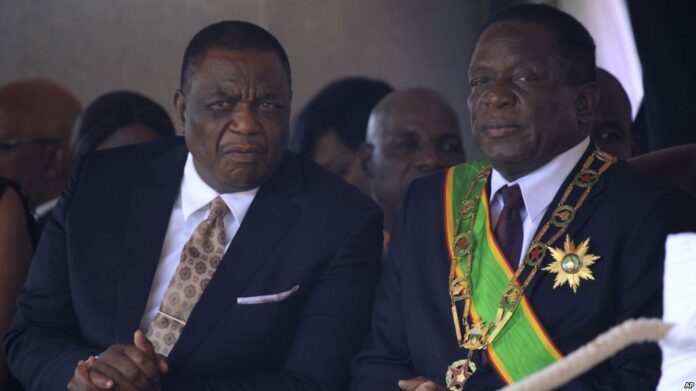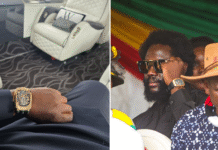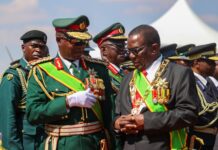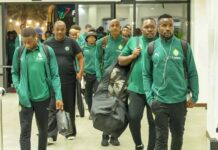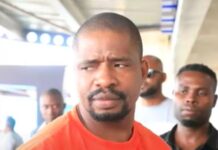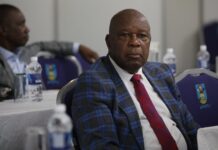HARARE – Zanu PF is once again gripped by vicious infighting, as the ruling party’s succession battles spill into the open. At the centre of the storm is Vice-President Constantino Chiwenga’s offensive against politically connected business cartels, known as zvigananda, which he accuses of looting the state under President Emmerson Mnangagwa’s watch.
By Kenneth Nyangani | Special Report
But beneath the anti-corruption rhetoric lies a deeper truth: Zimbabwe’s ruling party has returned to the same destructive script that marked Robert Mugabe’s twilight years — a toxic mix of personal vendettas, factional witch-hunts, and battles over who controls the spoils of power.
Liberation Credentials vs Corruption Crusade
The latest showdown erupted after State Security Minister Lovemore Matuke, a loyal Mnangagwa ally, accused Chiwenga of harbouring presidential ambitions. In response, Chiwenga retaliated by questioning Matuke’s liberation war credentials — an attack that provoked fury among war collaborators, who circulated a petition defending Matuke and denouncing Chiwenga’s remarks.
While the petition focused on history, analysts argue that this was merely a diversion. “This is less about who fought in the war and more about who leads Zanu PF after Mnangagwa,” said a Harare-based political economist. “The liberation credentials card has been weaponised before — Mugabe used it against his rivals in the 2000s, and now Chiwenga is dusting off the same playbook.”
Zvigananda and the Politics of Loot
At stake is control of Zimbabwe’s political economy. The zvigananda cartels — powerful networks in fuel, mining, agriculture, and currency trade — have become synonymous with Mnangagwa’s presidency. Chief among them is businessman Kudakwashe Tagwirei, accused of profiteering from state contracts and foreign currency allocations, while bankrolling Mnangagwa’s faction.
Chiwenga, determined to present himself as a corruption-buster, has zeroed in on these cartels. Yet critics say his campaign is selective. “Chiwenga is not dismantling corruption, he is dismantling Mnangagwa’s financial base,” one analyst noted.
The Money Trail: Lavish Weddings and Broken Deals
The feud deepened after former legislator Temba Mliswa alleged that businessman Wicknell Chivayo financed much of Chiwenga’s wedding to Colonel Miniyothabo Baloyi. According to Mliswa, Chivayo supplied luxury cars, cash totalling nearly US$500,000, a honeymoon at the Four Seasons resort in Seychelles, and shopping sprees worth millions in South Africa.
Relations reportedly soured when Chivayo defaulted on further payments, including US$450,000 for apartments for Chiwenga’s children. Analysts believe this fallout partly explains why Chiwenga turned his guns on the businessman.
“This is not a fight for transparency. It is a fight over unpaid debts and political betrayal,” said one political scientist.
Echoes of G40 vs Lacoste
For many Zimbabweans, the parallels with the Mugabe era are striking. In the years before the 2017 coup, Zanu PF was paralysed by the G40–Lacoste feud, with Mugabe backing Grace Mugabe’s G40 faction against Mnangagwa’s Lacoste camp. That battle featured manufactured scandals, staged burglaries, and personal attacks over war credentials — eerily similar to today’s drama.
Just as Mugabe used factionalism to prolong his rule, Mnangagwa appears to be benefiting from the Chiwenga–Tagwirei war, which keeps both camps distracted. “History is repeating itself,” noted a former Zanu PF insider. “Factionalism has always been the oxygen of Zanu PF — Mugabe survived on it, and now Mnangagwa is playing the same game.”
A Party Rotting From Within
Zanu PF’s fractures have left the party in disarray. Mnangagwa’s allies are said to be floating Kudakwashe Tagwirei as a potential successor, given his financial clout. Meanwhile, whispers in Harare suggest some within the Mnangagwa camp are lobbying to postpone the 2028 elections to 2030, a move that would buy time for the president to entrench his faction.
But analysts warn that such manoeuvres risk deepening public anger. “Ordinary Zimbabweans see a ruling elite obsessed with Rolls Royces, villas, and offshore bank accounts, while the majority suffer under inflation and poverty,” said a University of Zimbabwe lecturer.
The Road Ahead: Coup, Congress, or Collapse?
Zanu PF is heading towards its 2027 elective congress deeply divided. With Mnangagwa clinging to power and Chiwenga sharpening his knives, the outcome could range from another palace coup to prolonged paralysis.
What is certain is that the liberation party is no longer driven by ideology but by patronage. “Zanu PF has degenerated into a cartel of competing thieves,” one opposition MP told this newspaper. “The liberation legacy has been sold to the highest bidder, and now they are fighting over the loot.”
As the fissures widen, Zimbabwe’s future remains hostage to a corrupt elite trapped in a cycle of betrayal, revenge, and survival.


